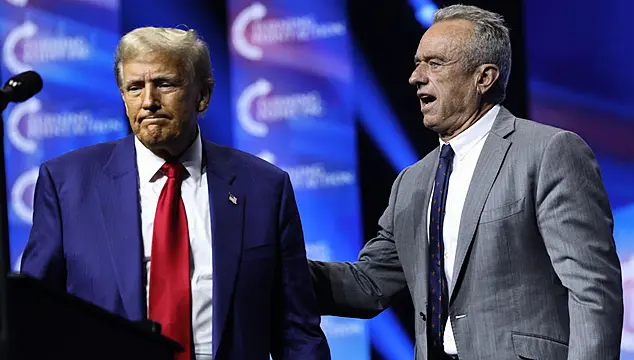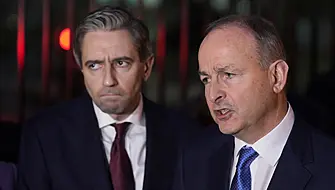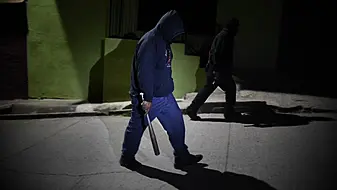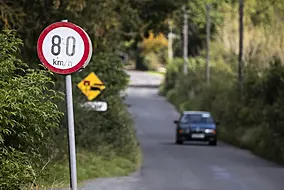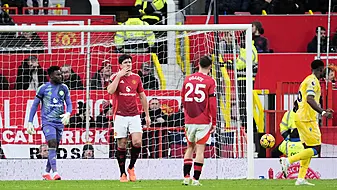Robert F Kennedy Jr looks set to play a prominent role in the health policy of US president-elect Donald Trump, with the vaccine sceptic's position considered a big risk by health officials.
Besides his famous name, who is RFK Jr?
Who is RFK Jr?
A member of the Kennedy family, RFK Jr is the son of Robert F Kennedy and nephew of John F Kennedy.
His uncle, the former president, was assassinated in 1963 and his father was assassinated in 1968, while running for president.
Mr Kennedy has been married three times and has six children.
He suffers from spasmodic dysphonia, a condition marked by a spasm of the vocal muscles. It makes his voice sound raspy and sometimes trembling.
Early career and drug problems
In 1982, Mr Kennedy started his career as an assistant district attorney for Manhattan. After failing the New York bar exam, he resigned the following year.
Mr Kennedy had a heroin problem, which he says started at the age of 15, and he was convicted for possession of the drug in 1983.
He was sentenced to two years of probation and community service, and said his drug use was over after entering a rehabilitation facility.
In 1984, Mr Kennedy began volunteering at The Hudson River Fisherman's Association, renamed Riverkeeper in 1986 after a patrol boat it had built with settlement money from legal victories preceding Mr Kennedy's arrival.
He was admitted to the New York Bar in 1985, and Riverkeeper then hired him as a senior attorney. This started his long association with environmental causes.
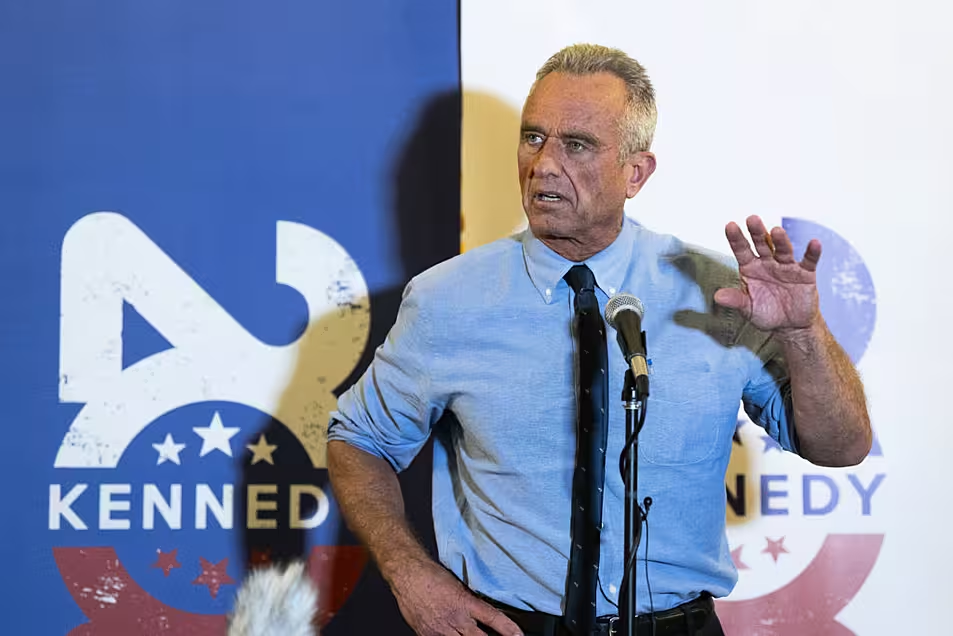
Environmental work
In 1987, Mr Kennedy founded the Environmental Litigation Clinic at Pace University School of Law. He served as the organisation's supervising attorney and co-director and clinical professor of law for three decades.
In 1999, he was involved in the group that founded the Waterkeeper Alliance.
In 1991, Mr Kennedy represented environmentalists and New York City watershed consumers in lawsuits against the city and water polluters in upstate New York.
He alleged the state of New York was failing in its responsibility to protect the water repository and supply. Five years after he started the cases, in 1996, he was central to the $1.2 billion New York City Watershed Agreement.
New York Magazine reported on the agreement in a cover story titled: 'The Kennedy Who Matters'.
Mr Kennedy worked on a number of prominent cases, including representing the National Association for the Advancement of Colored People (NAACP) against a proposal to build a garbage transfer station in a minority neighbourhood in Ossining, New York.
In 1987, he successfully sued Westchester County to reopen Croton Point Park, which was heavily used primarily by poor and minority communities from the Bronx.
Along with environmental causes, his political stances included issues surrounding economic inequality, while he was critical of US military intervention in foreign countries.
Early political aspirations
Mr Kennedy considered running for the US Senate in New York in 2000, a seat formerly held by his father.
He ultimately decided against running again in 2005 and 2008.
Mr Kennedy was also considered for various roles in Democratic administrations.

Anti-vaccine activism and public health conspiracy theories
While Mr Kennedy was a respected environmental lawyer for years, he is now more well-known for anti-vaccine misinformation and conspiracy theories around public health.
Children's Health Defense, a non-profit organisation Mr Kennedy founded, spread Covid-19 vaccine misinformation, including that vaccinated children died at a faster rate.
Dozens of young children died of measles in American Samoa in 2019 after anti-vaccine activists, including Mr Kennedy, spread misinformation about the vaccines' safety in the island state, according to FactCheck.org and Dr Paul Offit, the director of the Children's Hospital of Philadelphia's vaccine education centre.
In testimony to the US Congress, Mr Kennedy said he has never been opposed to vaccines and never told the public to avoid them.
In July 2023, White House officials joined a chorus of Democrats and medical professionals who criticised Mr Kennedy for claiming in a video that Covid-19 was targeted to attack white and Black people and that Jewish and Chinese people are mostly immune.
Mr Kennedy has also suggested anti-depressants cause school shootings, Wi-Fi radiation causes cancer and that the 2004 election that re-elected George W Bush was stolen, according to FactCheck.org.
2024 presidential campaign
Mr Kennedy initially said he would challenge for the Democratic nomination.
However, he subsequently announced he would run an independent campaign for the presidency. This came after he expressed frustration at the lack of opportunities to challenge US president Joe Biden, as the Democratic Party backed the incumbent.
His campaign received a huge financial boost from a number of Republican-associated political action committees.
However, the Trump campaign soon became concerned he could take votes from them too, with many polls suggesting he could take a significant portion of votes with US voters weary at the prospect of a Trump v Biden rematch.
Members of the Kennedy family, including RFK Jr's siblings, issued a statement condemning his campaign and endorsing the then-Democratic candidate, Joe Biden.
Mr Kennedy's campaign faltered as he faced challenges in getting on the ballot in many states.
It was also marked by odd moments, such as revelations about a 'brain worm'. It emerged that Mr Kennedy had attributed "cognitive problems" he suffered to a parasite.
In a 2012 deposition during his divorce, he said the issues were "caused by a worm that got into my brain and ate a portion of it and then died”.
In July 2024, an image emerged of Mr Kennedy holding what looked like a dog carcass. Mr Kennedy denied that he ate dog meat, and said the animal carcass in the picture was a goat.
To get ahead of a story that was due to be published in The New Yorker, Mr Kennedy released a video in August 2024 concerning a dead bear. He revealed that he had placed a dead six-month-old bear in Central Park after initially planning to skin it for meat.
Mr Kennedy claimed that the bear had been hit by a car in front of him and that he ultimately abandoned the carcass for fear that it would spoil before he could preserve it, deliberately positioning the body to give the impression that it had been struck by a cyclist in Central Park.
That was not the end of the animal-related controversies. In September 2024, the National Oceanic and Atmospheric Administration Fisheries Office of Law Enforcement announced that it was investigating an incident involving Mr Kennedy and a dead whale.
It came after an interview with Mr Kennedy's daughter Kathleen "Kick" Kennedy, from 2012, resurfaced. In it, Ms Kennedy recalled her father using a chainsaw to sever the head of a dead beached whale in Hyannis Port, Massachusetts, then using bungee cords to strap the whale's head to the top of their minivan for a five-hour drive home.
She said: "Every time we accelerated on the highway, whale juice would pour into the windows of the car, and it was the rankest thing on the planet.
"We all had plastic bags over our heads with mouth holes cut out, and people on the highway were giving us the finger, but that was just normal day-to-day stuff for us.”
By the time this story emerged, Mr Kennedy had already thrown his hat in with Mr Trump.
After previously describing Mr Trump as a "terrible human being" and a "discredit to democracy", Mr Kennedy did a U-turn and announced he would be dropping out to endorse Mr Trump.

This came following protracted talks between staff from the two campaigns, and Mr Kennedy had previously reached out to Kamala Harris' campaign with no response.
He appeared at a number of rallies for Mr Trump, and even posted a last-minute message telling voters not to vote for him in the states where he remained on the ticket, and instead give their vote to the Republican.
He pledged to 'Make America Healthy Again', a play on Mr Trump's 'Make America Great Again' catchphrase.
What role will Mr Kennedy play in the Trump administration?
Mr Trump recently said he would let former presidential candidate and anti-vaccine advocate Robert F Kennedy Jr "go wild" on vaccine and healthcare policy.
Mr Kennedy has said that Mr Trump promised him control over the FDA, CDC, HHS, and the USDA. Those jobs could potentially give him control over what vaccines are approved and whether Americans are recommended to receive them.

Trump transition co-chair Howard Lutnick has said Mr Kennedy is not going to be put in charge of the Department of Health and Human Services, but suggested he could advise on vaccines.
Jeremy Levin, CEO of biotech company Ovid Therapeutics OVID.N and former chairman of biotech lobby group BIO, said he would be alarmed if Mr Kennedy was given oversight over vaccines, and that other executives had also expressed concern.
"Vaccine denialism, which is a central plank of RFK's, is perhaps as dangerous as anything you can imagine," he said, adding that president Trump's previous appointments for the Covid vaccine effort and the FDA suggest to him that more moderate positions will win out. Some executives were also concerned that Mr Kennedy's influence could harm the US' reputation and ability to review new drugs.
On Saturday, it emerged Mr Kennedy was involved in vetting resumes of potential US Department of Health appointments. - Additional reporting from Reuters
